|
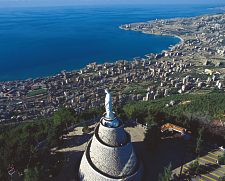
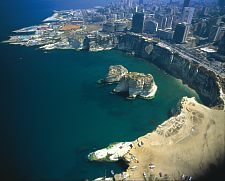
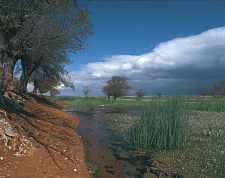

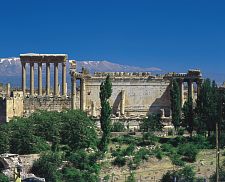
| |
Lebanon and Syria
Limboland
BEIRUT | Sep 09, 2005
Source: The Economist
TWO potentially crucial votes faced Lebanon last week. Oddly, its people took
part in neither, and neither vote produced obvious change. Yet the voting
tallies did serve to clarify where the battle lines lie, in what has until
recently been a smoke-shrouded struggle over the long-troubled country's fate.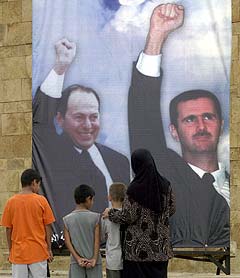
The UN Security Council voted, with nine in favour against six abstentions, to
ask Syria to remove the troops it has kept in Lebanon for 28 years, to ask
Lebanon to hold a proper presidential election according to its constitution and
to get it to disband all irregular militias. In other words, the UN told Lebanon
to start acting like a normal, sovereign state.
Within hours, however, Lebanon's parliament defied the order, voting to twist
its constitutional rules so as to extend the term of Emile Lahoud, the current,
doggedly pro-Syrian president. Syria's 15,000 soldiers stayed put in the east of
the country, as did the guerrillas of Hizbullah, a Shia party accused of
terrorism by America (among others), in the country's south. Basking in
congratulations from Lebanon's intelligence services, Hizbullah and other actors
aligned with Syria, Mr Lahoud vowed to “bolster ties between the army and the
national resistance”, Lebanese pol-speak for Hizbullah's fighters, and to
“strengthen co-operation and co-ordination with our Syrian brothers”.
Perhaps nothing in Lebanon will change. It is quite fashionable in the Middle
East to defy UN resolutions and, though the Americans recently slapped sanctions
on Syria, their troubles in next-door Iraq may have reduced their appetite for
whipping Arab dictatorships into line.
As for the hapless Lebanese, their resentment of Syria, a place they tend to
regard as thuggish and backward, certainly runs deep. Many blame Syrian meddling
for what they see as the decline of traditions that once made the country
prosper, and still make it unique among Arab states. They see civil rights,
freedom of speech, open trade and the judiciary all under threat. The imposed
alliance with Syria also exposes Lebanon to the frequent and sometimes violent
wrath of its other neighbour, Israel.
But such resentment is still, more than a decade after the end of the country's
15-year civil war, tempered by a fear of rocking Lebanon's own boat—leaky and
rudderless but still surprisingly comfortable. Besides, Syria's hold over
Lebanon is not simply a matter of armed force. The two countries' common
language, culture and history, plus the fact that in the end it was Syrian power
that brought Lebanon's war to a close, are important factors.
Moreover, business interests, both licit and not, tie much of Beirut's political
class to Damascus's inner circle. Several Lebanese institutions, including the
army and the courts, have been thoroughly infiltrated by Syria's friends, and
are in effect used to intimidate the country's perceived enemies. And Hizbullah
is not Syria's only ideological ally in Lebanon. A range of Arab nationalist,
Islamist and other groups also see Damascus as a bulwark against the supposed
neo-imperialist and Zionist designs of the West. Demography bolsters these
forces, as Lebanon's Christians, who tend to be pro-western, emigrate in larger
numbers than other sects.
Syria has, over the decades, seen off many challenges to its creeping dominance
of Lebanon. During the civil war its army ruthlessly crushed first Palestinian,
then Christian militias. Syria's Shia allies bloodied American and French
peacekeeping forces in the 1980s, and later hounded Israel from its long and
messy occupation of south Lebanon.
This time, Syria and its local proxies had no need for overt force. It is said
in Beirut that some politicians, including the billionaire prime minister, Rafik
Hariri, who has often clashed with Mr Lahoud and has angered the government in
Damascus by trying to steer independently, got blunter orders than usual to do
Syria's bidding. But other MPs voted to keep Mr Lahoud because they are surer of
Syria's staying power than of the UN Security Council's will to impose its
wishes.
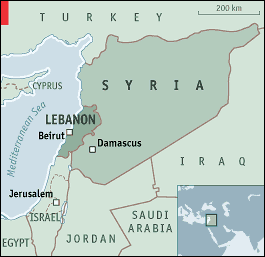
Yet it would be a mistake to assume that this latest round marks another
clear-cut Syrian victory, as Syrian officials have portrayed it. Syria's
president, Bashar Assad, has, in effect, thrown down a gauntlet to both America
and France—the latter being Lebanon's former coloniser, as well as the historic
defender of Christian Lebanese interests, and now the main instigator of
Security Council action. He has also produced an issue that may help Lebanon's
own fragmented opposition to coalesce.
In the past, Syria has managed to counter America's general hostility by feeding
officials in Washington with useful intelligence or by playing the Americans off
against friendlier Europeans and Arabs. But America has hardened its policy in
the wake of its Iraqi difficulties and is ever more in tune with Syria's mortal
enemy, Israel. Despite Syrian moves to assuage them, American suspicions linger
that the government is subtly aiding both the Sunni and the Shia resistance
movements in Iraq, with the long-term goal of tightening Syria's 20-year-old
alliance with Iran, another pariah state in American eyes.
Bar Iran, Syria's other historic friendships have also frayed. The European
Union, on the brink of signing a big trade deal last year, backed off amid
worries about Syria's human-rights record and chemical-weapon stocks. Other
regional powers, such as Turkey, Saudi Arabia and Egypt, are loth to back Syria
with much more than talk. Syria faces internal troubles, too, including a feeble
economy and unrest among its large Kurdish minority.
It may be that Syria's very weakness is what has prompted it to tighten its grip
on Lebanon. It may also be that outside powers, however much they would like to
see Lebanon reborn as the model pro-western state it once nearly was, do not
ultimately care enough about the little country to sustain pressure on Syria to
relinquish it. But Mr Assad should not count on that.
|